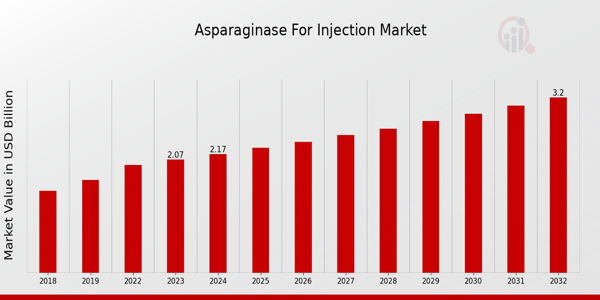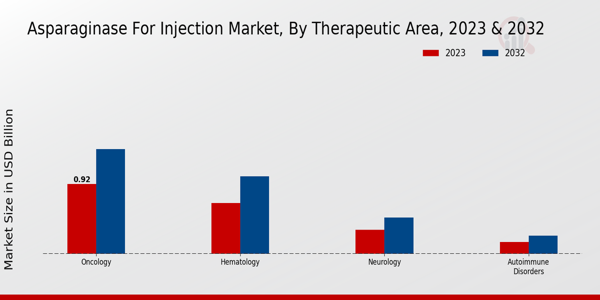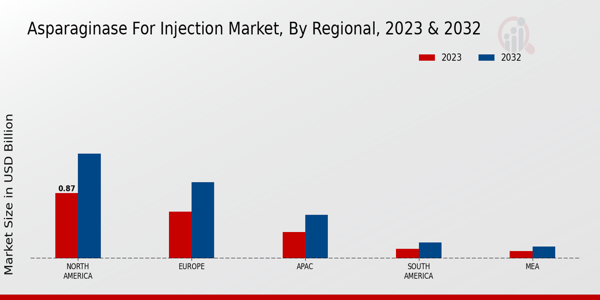Asparaginase for Injection Market Overview
As per MRFR analysis, the Asparaginase for Injection Market Size was estimated at 2.28 (USD Billion) in 2024. The Asparaginase for Injection Market Industry is expected to grow from 2.39 (USD Billion) in 2025 to 3.71 (USD Billion) till 2034, at a CAGR (growth rate) is expected to be around 4.99% during the forecast period (2025 - 2034).
Key Asparaginase for Injection Market Trends Highlighted
The growing prevalence of some cancers, especially acute lymphoblastic leukemia (ALL), is propelling the Asparaginase for Injection Market's notable expansion. Growing knowledge of the drug's efficacy in treating particular cancer types has increased demand and usage in the healthcare industry, contributing to this increase.
Additionally, the market is expected to grow as a result of continuous research and development efforts to improve asparaginase's therapeutic effects. This market offers a plethora of chances to investigate. New approaches to medication composition and distribution offer opportunities to enhance treatment results and patient compliance.
Furthermore, emerging markets are becoming more open to implementing cutting-edge cancer treatments, which could propel market growth even further. Research institutes and pharmaceutical businesses working together can produce biobetters and next-generation asparaginase products that improve safety and efficacy profiles.
Recent trends indicate a shift towards personalized medicine, with healthcare professionals increasingly focusing on tailoring therapies to individual patient profiles. This trend is influencing how asparaginase is incorporated into treatment regimens, particularly in combination therapies. Moreover, increased investments in cancer research and the development of newer formulations are becoming more prevalent.
As regulatory pathways become clearer, more companies are entering the market with innovative products, contributing to competitive dynamics that can benefit patients through improved therapies. The trend towards more effective and safer treatment options is likely to keep the market evolving in response to both patient needs and scientific advancements.

Source: Primary Research, Secondary Research, MRFR Database and Analyst Review
Asparaginase for Injection Market Drivers
Increasing Prevalence of Hematological Malignancies
The rising incidence of hematological malignancies such as leukemia and lymphomas has significantly driven the growth of the Asparaginase for Injection Market. The need for effective therapies to combat these diseases has led to an increasing demand for asparaginase, which is a crucial component in drug regimens for managing these cancers.
As the understanding of oncology progresses and more cases of hematologic cancers are diagnosed globally, the market for asparaginase is expected to witness substantial growth.
With advancements in diagnostic techniques and an increase in awareness about early detection, more patients are being treated at earlier stages when asparaginase can be particularly effective. Additionally, the expansion of healthcare infrastructures in developing regions has also enabled more patients to receive treatments, further contributing to market growth.
As medical advancements continue, treatment protocols increasingly include asparaginase-based therapies, reinforcing its importance in cancer treatment and thus driving the overall market forward.
The Asparaginase for Injection Market is also supported by ongoing research and clinical trials that explore new applications and formulations of asparaginase, indicating a promising future for the market.
Technological Advancements in Drug Formulation
Technological innovations in drug formulation and manufacturing techniques have played a vital role in enhancing the effectiveness and safety profiles of asparaginase products.
With the incorporation of new technologies, the pharmaceutical companies can develop more efficient delivery methods and formulations that optimize the therapeutic outcomes of asparaginase. These advancements have led to the introduction of improved asparaginase products that are characterized by fewer side effects, which encourages more oncologists to adopt these therapies.
As a result, the Asparaginase for Injection Market benefits from increased prescription rates. Furthermore, the continuous investment in research and development to explore novel formulations is expected to sustain market growth in the coming years.
Growing Investment in Healthcare Infrastructure
The increasing investment in healthcare infrastructure globally is a significant driver for the Asparaginase for Injection Market. Enhanced healthcare facilities contribute to improved patient access to oncology treatments, including asparaginase therapies.
Governments and private entities are focusing on strengthening healthcare systems, thereby creating more opportunities for the distribution and administration of asparaginase injections.
This trend is observed particularly in emerging economies, where healthcare accessibility has improved markedly. Improved healthcare infrastructure not only enables better patient care but also motivates pharmaceutical companies to expand their reach in these markets, further propelling market growth.
Asparaginase for Injection Market Segment Insights:
Asparaginase for Injection Market Therapeutic Area Insights
The Asparaginase for Injection Market is experiencing significant growth within the Therapeutic Area segment. This reflects a robust market expansion driven by the increasing prevalence of diseases treated with asparaginase, particularly in oncology-related therapies.
The Oncology segment dominated this market, holding a substantial valuation of 0.92 USD Billion in 2023, expected to increase to 1.38 USD Billion in 2032. This growth can be attributed to the rising incidence of cancers that require targeted therapies, making asparaginase crucial in treatment protocols.
In the realm of Hematology, there was also notable demand, with the segment valued at 0.67 USD Billion in 2023 and anticipated to grow to 1.02 USD Billion by 2032. This segment addresses hematological malignancies, and its significance is augmented by the continued focus on the development of effective treatments for blood cancers.
Neurology was another area under this Therapeutic Area, with a market valuation of 0.32 USD Billion in 2023, projected to reach 0.48 USD Billion by 2032. While this segment was the smallest, it reflected emerging opportunities in treating neurological conditions where asparaginase may play a role.
The Autoimmune Disorders segment, valued at 0.16 USD Billion in 2023 and expected to grow to 0.24 USD Billion by 2032, represented a unique niche of the market that is gradually gaining recognition.
Overall, the Asparaginase for Injection Market segmentation illustrated a landscape where oncology represents the majority holding, reflecting the pressing need for effective cancer treatments, while hematology remains significant due to the rise in blood disorders. Neurology and autoimmune disorders may not be as dominant, but they are essential for a comprehensive approach to treatment in the therapeutic domain.
As the market continues to develop, opportunities for innovation in these areas remain promising, supported by the evolving understanding of disease mechanisms where asparaginase can be beneficial.

Source: Primary Research, Secondary Research, MRFR Database and Analyst Review
Asparaginase for Injection Market Formulation Type Insights
The Asparaginase for Injection Market is seeing increased interest in various formulation types, which contribute significantly to overall market dynamics. The formulation types include Lyophilized Powder, Solution for Injection, and Concentrated Solution, each catering to specific therapeutic needs.
Lyophilized Powder is often preferred due to its stability and longer shelf life, making it a crucial component in cancer treatment regimes. The Solution for Injection formulation also occupies a significant share owing to its ease of administration and rapid onset of action.
Meanwhile, the Concentrated Solution offers distinct advantages in terms of dosage efficiency and treatment customization, enhancing patient compliance. With a projected growth leading into 2032, the various formulation types highlight the evolving landscape in the Asparaginase for Injection Market, driven by an increasing prevalence of hematological malignancies and the ongoing demand for effective therapeutic solutions.
As these dynamics unfold, they present both challenges and opportunities related to manufacturing, regulatory compliance, and market competition, further influencing the overall Asparaginase for Injection Market statistics and data.
Asparaginase for Injection Market Route of Administration Insights
The Asparaginase for Injection Market showcases significant diversity in the Route of Administration segment. This market is primarily categorized into Intravenous, Intramuscular, and Subcutaneous routes, each playing a vital role in the administration of Asparaginase.
The Intravenous route stands out for its rapid onset of action, making it essential for acute care scenarios, while the Intramuscular route is often preferred for its ease of administration in outpatient settings. Subcutaneous administration is growing in popularity due to its convenience and ability to provide more prolonged drug absorption.
As healthcare providers seek to improve patient compliance and outcomes, these routes are becoming increasingly important, reflecting trends toward personalized medicine and patient-centric care. The market growth can be attributed to rising cancer cases, increasing demand for effective treatment options, and ongoing advancements in administration technologies.
Overall, the Asparaginase for Injection Market segmentation highlights the strategic importance of tailored administration routes in optimizing treatment efficacy.
Asparaginase for Injection Market Distribution Channel Insights
The Asparaginase for Injection Market exhibits a diverse Distribution Channel landscape that plays a critical role in its growth. This market segmentation reveals that Hospital Pharmacies hold a significant place, primarily due to their proximity to patients and healthcare professionals, facilitating quicker access to vital medications.
Retail Pharmacies also contribute substantially as they cater to a broad range of customers, ensuring that patients have convenient access to Asparaginase injections outside hospital settings.
Meanwhile, Online Pharmacies are gaining momentum in the market, driven by the increasing trend of e-commerce, which allows patients to acquire treatments more easily, often enhancing adherence to prescribed therapies.
Together, these distribution channels are crucial in shaping the dynamics of the Asparaginase for Injection Market, responding to the needs of different patient demographics while capitalizing on burgeoning digital trends.
The interplay between these channels is expected to continue evolving, highlighting the importance of understanding consumer preferences and adaptation to market challenges for sustained growth.
Asparaginase for Injection Market Regional Insights
The regional segmentation of the market highlighted North America as a leading segment, projected to generate 0.87 USD Billion in 2023 and reach 1.39 USD Billion by 2032, indicating its majority holding of the market. Europe followed, with a valuation of 0.62 USD Billion in 2023 and expected growth to 1.01 USD Billion, reflecting its significant demand.
The Asia-Pacific (APAC) region observed a steady growth trajectory, with values of 0.35 USD Billion in 2023, climbing to 0.58 USD Billion, while South America showed lower figures at 0.13 USD Billion in 2023, increasing to 0.21 USD Billion. The Middle East and Africa (MEA) accounted for the least market size, valued at 0.1 USD Billion in 2023 and anticipated at 0.16 USD Billion in 2032.
This distribution indicated a diverse growth potential across regions, with North America and Europe dominating due to advanced healthcare systems and strong research capabilities, while APAC showed promise fueled by increasing healthcare access and rising cancer prevalence.
The data also points to the importance of addressing market growth challenges and opportunities that vary by region, ultimately shaping the Asparaginase for Injection Market statistics.

Source: Primary Research, Secondary Research, MRFR Database and Analyst Review
Asparaginase for Injection Market Key Players and Competitive Insights:
The Asparaginase for Injection Market is characterized by a diverse competitive landscape where a variety of pharmaceutical companies strive to establish their foothold in this niche therapeutic area. Asparaginase is primarily used in the treatment of specific types of cancers, particularly acute lymphoblastic leukemia (ALL) and lymphoblastic lymphoma, making its demand critical in oncology.
The market dynamics are driven by several factors, including advancements in drug formulation, regulatory approvals, and the ongoing need for effective cancer therapies. Companies are focusing on enhancing the efficacy and safety profiles of their asparaginase formulations while grappling with challenges such as pricing pressures and the emergence of biosimilars.
As the market continues to evolve, strategic collaborations, partnerships, and mergers and acquisitions are becoming common as players aim to strengthen their market positioning and expand their product offerings.
Sandoz, a leading global player in the biopharmaceuticals sector, has successfully carved out a significant presence in the Asparaginase for Injection Market. The company's strength lies in its robust portfolio of high-quality generic and biosimilar medicines, which includes asparaginase formulations that cater to the growing demand for effective cancer treatments.
Sandoz is renowned for its focus on patient accessibility and affordability, enabling broader patient access to critical medications. The company leverages its extensive experience in the biotechnology domain, allowing it to maintain rigorous quality and safety standards in its products.
Additionally, Sandoz's established distribution networks and deep relationships with healthcare providers enhance its ability to deliver its asparaginase products reliably to patients in need, thereby solidifying its market presence.
Shire is another key player in the Asparaginase for Injection Market, recognized for its commitment to transformative therapies in rare diseases and specialized conditions. The company has developed a strong reputation for producing high-quality asparaginase products, which have been pivotal in treating acute lymphoblastic leukemia and other related disorders.
Shire's strengths lie in its dedicated research and development efforts, which facilitate innovation and the introduction of advanced formulations into the market. The company also emphasizes patient-centered approaches, focusing on providing comprehensive support and information for healthcare providers and patients alike.
With an unwavering dedication to improving patient outcomes, Shire continues to enhance its product offerings and expand its reach in the oncology domain, contributing significantly to the overall competitive fabric of the asparaginase market.
Key Companies in the Asparaginase for Injection Market Include:
- Teva Pharmaceutical Industries
- Peregrine Pharmaceuticals
Asparaginase for Injection Market Developments
Recent developments in the Asparaginase for Injection Market indicate increased activity among key players such as Sandoz, Shire, Eli Lilly, and Jazz Pharmaceuticals, focusing on enhancing their product offerings to meet rising demand. The market has seen a push for innovation amidst expanding indications for asparaginase products in treating various malignancies, particularly acute lymphoblastic leukemia (ALL).
Companies like Teva Pharmaceutical Industries and Bristol-Myers Squibb are emphasizing research and development to deliver differentiated therapies as competition in this space intensifies. Additionally, Amgen and Roche are exploring strategic partnerships to accelerate product availability and expand their market footprint.
Recently, there have been notable mergers in the sector, with Novartis acquiring a smaller biotech firm to bolster its oncology pipeline. Moreover, growth in the market valuation of companies such as MediGene and AstraZeneca underscores a positive environment for investment and development in the asparaginase domain.
The focus on improving patient access and affordability has driven discussions among industry stakeholders, indicating a dynamic landscape for the future of asparaginase injectable therapies, which is expected to continue evolving based on ongoing regulatory approvals and market demands.
Asparaginase for Injection Market Segmentation Insights
Asparaginase for Injection Market Therapeutic Area Outlook
Asparaginase for Injection Market Formulation Type Outlook
Asparaginase for Injection Market Route of Administration Outlook
Asparaginase for Injection Market Distribution Channel Outlook
Asparaginase for Injection Market Regional Outlook
| Report Attribute/Metric |
Details |
|
Market Size 2024
|
2.28 (USD Billion)
|
|
Market Size 2025
|
2.39 (USD Billion)
|
|
Market Size 2034
|
3.71 (USD Billion)
|
|
Compound Annual Growth Rate (CAGR)
|
4.99 % (2025 - 2034)
|
|
Report Coverage
|
Revenue Forecast, Competitive Landscape, Growth Factors, and Trends
|
|
Base Year
|
2024
|
|
Market Forecast Period
|
2025 - 2034
|
|
Historical Data
|
2020 - 2024
|
| Market Forecast Units |
USD Billion |
| Key Companies Profiled |
Sandoz, Shire, Eli Lilly, Teva Pharmaceutical Industries, Merck and Co, Jazz Pharmaceuticals, Novartis, AstraZeneca, Amgen, MediGene, Bristol-Myers Squibb, Peregrine Pharmaceuticals, Roche, Baxter International, Pfizer |
| Segments Covered |
Therapeutic Area, Formulation Type, Route of Administration, Distribution Channel, Regional |
| Key Market Opportunities |
Rising incidence of leukemia, Increasing R for cancer therapies, Expanding markets in developing regions, Advances in biopharmaceutical manufacturing, Growing demand for personalized medicine |
| Key Market Dynamics |
Rising incidence of leukemia, Increased demand for effective therapies, Growing investment in biosimilars, Expanding global healthcare access, Regulatory advancements in drug approvals |
| Countries Covered |
North America, Europe, APAC, South America, MEA |
Frequently Asked Questions (FAQ) :
The Asparaginase for Injection Market is projected to be valued at 3.2 USD Billion by 2034.
The expected CAGR for the Asparaginase for Injection Market from 2025 to 2032 is 4.99%.
North America is projected to dominate the Asparaginase for Injection Market with a value of 1.39 USD Billion by 2034.
The market value for Oncology is expected to increase from 0.92 USD Billion in 2023 to 1.38 USD Billion by 2034.
The anticipated market size for the Hematology segment is 1.02 USD Billion in 2034.
Major players in the market include Sandoz, Shire, Eli Lilly, Teva Pharmaceutical Industries, and Merck and Co.
The expected market value for the APAC region in 2034 is 0.58 USD Billion.
The Autoimmune Disorders segment is projected to grow from 0.16 USD Billion in 2023 to 0.24 USD Billion by 2034.
The Middle East and Africa (MEA) region had the smallest market size of 0.1 USD Billion in 2023.
The projected market size for the Neurology segment is 0.48 USD Billion by 2034.

















